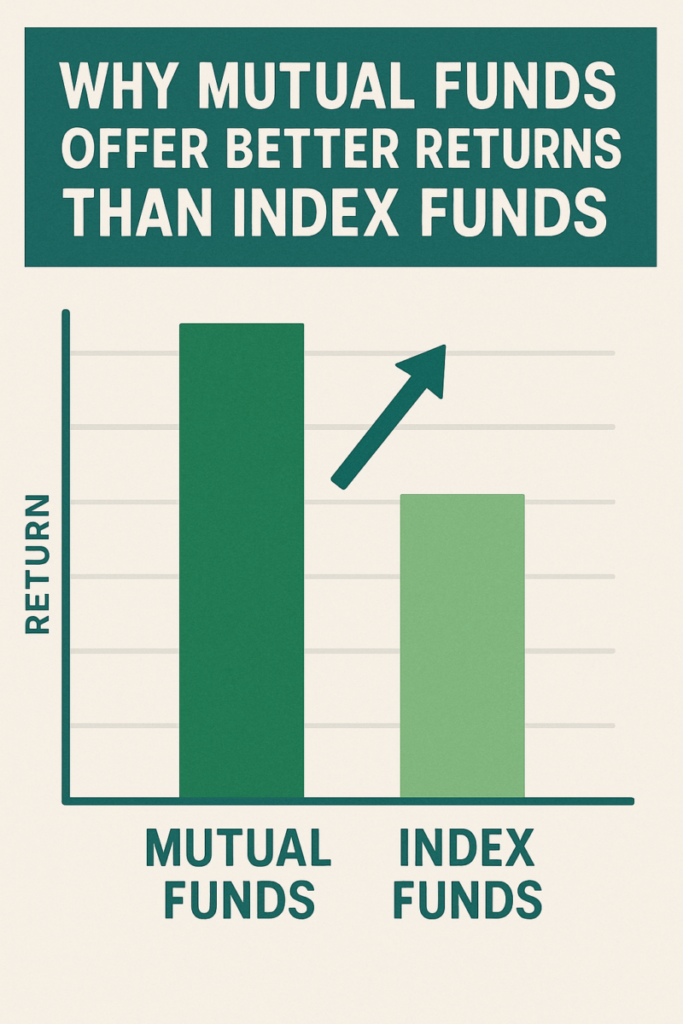Why Mutual Funds Offer Better Returns Than Index Funds
When comparing index funds to mutual funds, it becomes clear that mutual funds have a built-in advantage: they are not restricted to a fixed set of companies. Index funds, on the other hand, rely entirely on a predefined list of stocks—like the top 50 companies in the Nifty 50 index or the S&P 500. This makes index funds inherently limited, while mutual funds have the freedom to explore the entire market and select only the best-performing companies. This flexibility gives mutual funds a significant edge when it comes to generating returns.
 Index Funds Depend on the Full Group of 50 Stocks
Index Funds Depend on the Full Group of 50 Stocks
Index funds track an index. That means they invest in all the companies that make up that index, in the exact proportion that the index represents. For example, an index fund tracking the Nifty 50 will hold all 50 companies, regardless of whether those companies are doing well or poorly.
Here’s the catch: not all 50 companies perform well at the same time. In fact, on most trading days, only 20 to 25 stocks might be rising while the rest could be flat or declining. So, even if a few companies are doing well, the index fund can still deliver mediocre returns if the rest of the companies pull down the average.
The success of an index fund relies heavily on a large number of its components performing positively. If only 10 or 15 stocks in the index rise, while the rest underperform, the fund’s overall growth is limited. It doesn’t matter if a few stocks skyrocket—because the fund holds all the others too, including the laggards.
Mutual funds don’t have that limitation. A mutual fund manager can select stocks from across the entire market—large-cap, mid-cap, small-cap, multi-sector, domestic or international. They are not tied to any index or fixed list. This freedom allows mutual funds to focus only on high-potential performers.
Why Mutual Funds Offer Better Returns Than Index Funds is Even if only two or three stocks in the market are doing exceptionally well, a mutual fund manager can load up on those specific winners. And sometimes, that’s all it takes to generate solid returns. Mutual funds don’t need all 50 stocks to do well. Just a few right picks can make a huge difference.
For example, in 2023, companies in sectors like defense, EV manufacturing, and specialty chemicals were among the top performers. Actively managed mutual funds that focused on these sectors generated impressive returns, while index funds barely caught the rally because most of those companies weren’t in the main index.

Insurance or investments, you cannot depend on a call center attendant
Agility in Volatile Markets
During volatile times—like the correction on April 7, 2025—index funds took a hit because they couldn’t react. They held all the declining stocks as per the index. But mutual funds had the ability to reduce exposure to weak sectors and move into cash or more stable options. That kind of agility protects investor wealth.
Also, mutual funds can actively avoid bad or overvalued stocks. If a company in the index is performing poorly or facing a scandal, an index fund still holds it. A mutual fund can drop it immediately.
Index funds are simple, but their simplicity is their biggest weakness. By depending on all 50 (or more) companies in an index to perform, they often deliver just average returns. Why mutual funds offer better returns than index funds is their flexibility in nature. Mutual funds, on the other hand, use their freedom to search the entire market for the best opportunities. They don’t need all stocks to rise—just a few winners are enough to generate great returns. For investors looking for flexibility, strategy, and smarter allocation, mutual funds are the better path to long-term gains.


